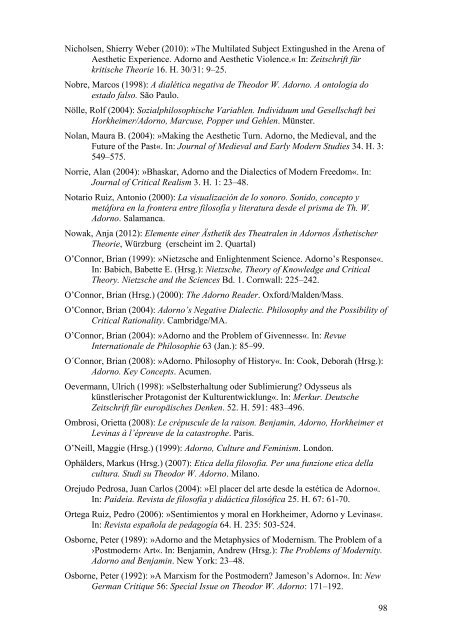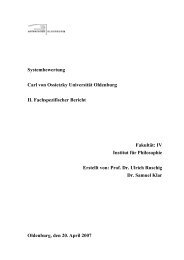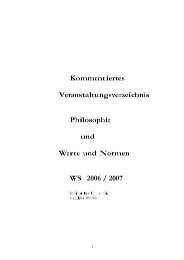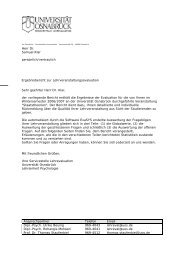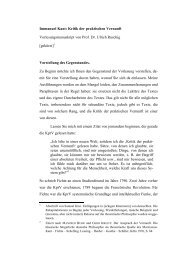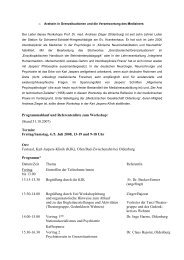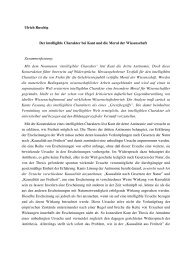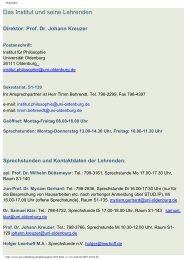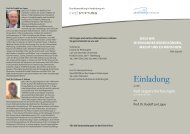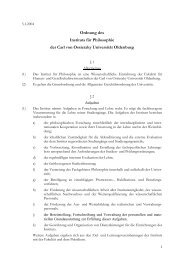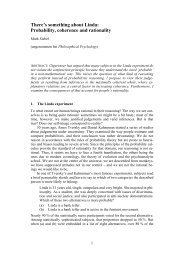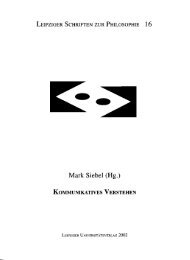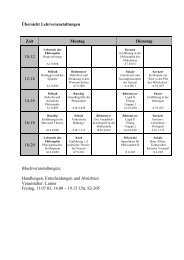Leben - Institut für Philosophie
Leben - Institut für Philosophie
Leben - Institut für Philosophie
Sie wollen auch ein ePaper? Erhöhen Sie die Reichweite Ihrer Titel.
YUMPU macht aus Druck-PDFs automatisch weboptimierte ePaper, die Google liebt.
Nicholsen, Shierry Weber (2010): »The Multilated Subject Extingushed in the Arena of<br />
Aesthetic Experience. Adorno and Aesthetic Violence.« In: Zeitschrift <strong>für</strong><br />
kritische Theorie 16. H. 30/31: 9–25.<br />
Nobre, Marcos (1998): A dialética negativa de Theodor W. Adorno. A ontologia do<br />
estado falso. São Paulo.<br />
Nölle, Rolf (2004): Sozialphilosophische Variablen. Individuum und Gesellschaft bei<br />
Horkheimer/Adorno, Marcuse, Popper und Gehlen. Münster.<br />
Nolan, Maura B. (2004): »Making the Aesthetic Turn. Adorno, the Medieval, and the<br />
Future of the Past«. In: Journal of Medieval and Early Modern Studies 34. H. 3:<br />
549–575.<br />
Norrie, Alan (2004): »Bhaskar, Adorno and the Dialectics of Modern Freedom«. In:<br />
Journal of Critical Realism 3. H. 1: 23–48.<br />
Notario Ruiz, Antonio (2000): La visualización de lo sonoro. Sonido, concepto y<br />
metáfora en la frontera entre filosofía y literatura desde el prisma de Th. W.<br />
Adorno. Salamanca.<br />
Nowak, Anja (2012): Elemente einer Ästhetik des Theatralen in Adornos Ästhetischer<br />
Theorie, Würzburg (erscheint im 2. Quartal)<br />
O’Connor, Brian (1999): »Nietzsche and Enlightenment Science. Adorno’s Response«.<br />
In: Babich, Babette E. (Hrsg.): Nietzsche, Theory of Knowledge and Critical<br />
Theory. Nietzsche and the Sciences Bd. 1. Cornwall: 225–242.<br />
O’Connor, Brian (Hrsg.) (2000): The Adorno Reader. Oxford/Malden/Mass.<br />
O’Connor, Brian (2004): Adorno’s Negative Dialectic. Philosophy and the Possibility of<br />
Critical Rationality. Cambridge/MA.<br />
O’Connor, Brian (2004): »Adorno and the Problem of Givenness«. In: Revue<br />
Internationale de <strong>Philosophie</strong> 63 (Jan.): 85–99.<br />
O´Connor, Brian (2008): »Adorno. Philosophy of History«. In: Cook, Deborah (Hrsg.):<br />
Adorno. Key Concepts. Acumen.<br />
Oevermann, Ulrich (1998): »Selbsterhaltung oder Sublimierung? Odysseus als<br />
künstlerischer Protagonist der Kulturentwicklung«. In: Merkur. Deutsche<br />
Zeitschrift <strong>für</strong> europäisches Denken. 52. H. 591: 483–496.<br />
Ombrosi, Orietta (2008): Le crépuscule de la raison. Benjamin, Adorno, Horkheimer et<br />
Levinas à l’épreuve de la catastrophe. Paris.<br />
O’Neill, Maggie (Hrsg.) (1999): Adorno, Culture and Feminism. London.<br />
Ophälders, Markus (Hrsg.) (2007): Etica della filosofia. Per una funzione etica della<br />
cultura. Studi su Theodor W. Adorno. Milano.<br />
Orejudo Pedrosa, Juan Carlos (2004): »El placer del arte desde la estética de Adorno«.<br />
In: Paideia. Revista de filosofía y didáctica filosófica 25. H. 67: 61-70.<br />
Ortega Ruiz, Pedro (2006): »Sentimientos y moral en Horkheimer, Adorno y Levinas«.<br />
In: Revista española de pedagogía 64. H. 235: 503-524.<br />
Osborne, Peter (1989): »Adorno and the Metaphysics of Modernism. The Problem of a<br />
›Postmodern‹ Art«. In: Benjamin, Andrew (Hrsg.): The Problems of Modernity.<br />
Adorno and Benjamin. New York: 23–48.<br />
Osborne, Peter (1992): »A Marxism for the Postmodern? Jameson’s Adorno«. In: New<br />
German Critique 56: Special Issue on Theodor W. Adorno: 171–192.<br />
98


